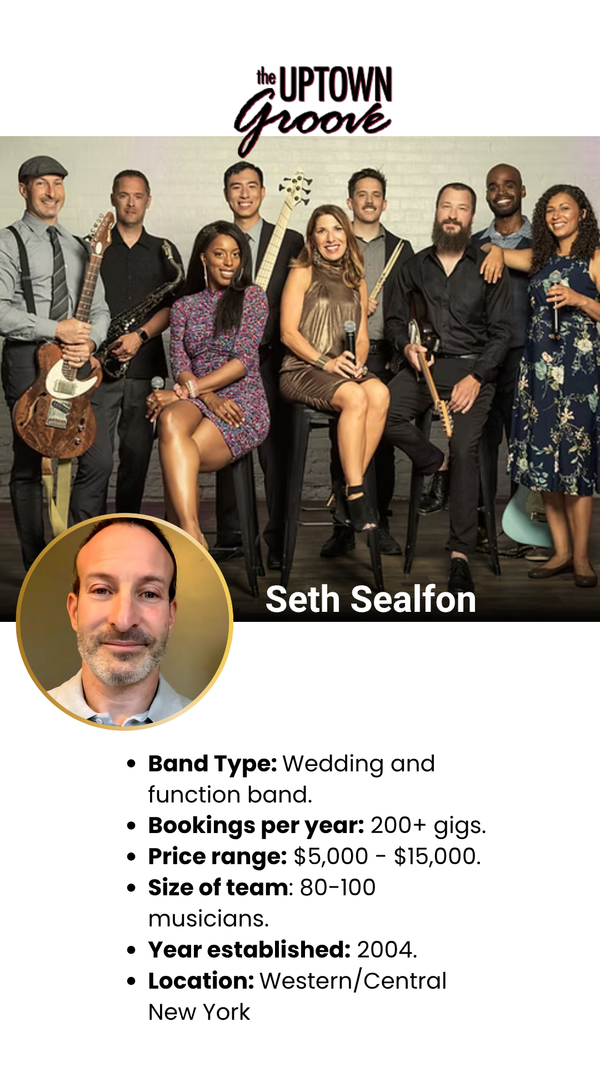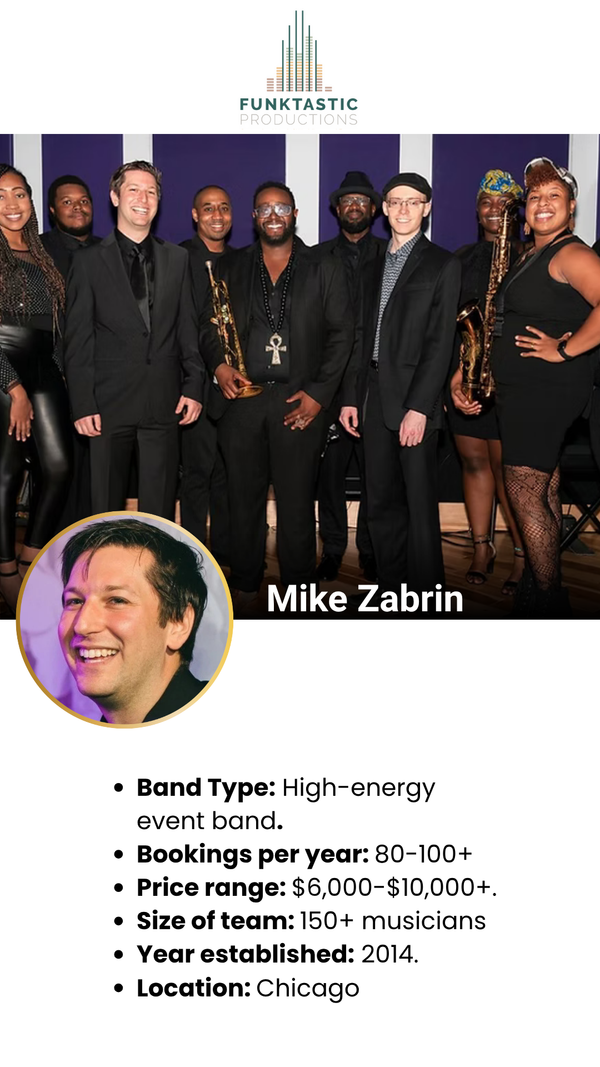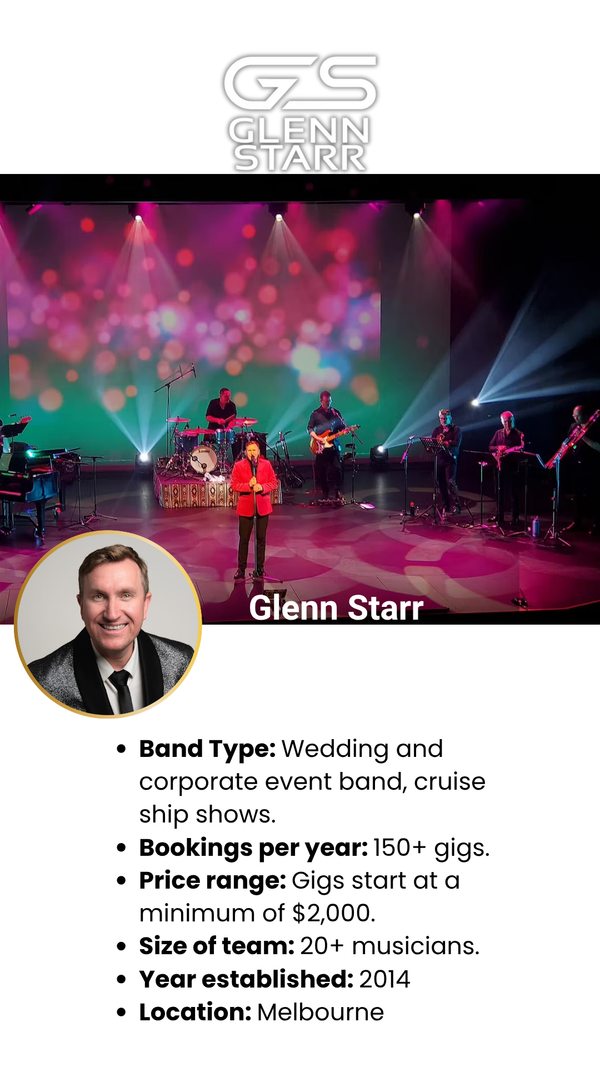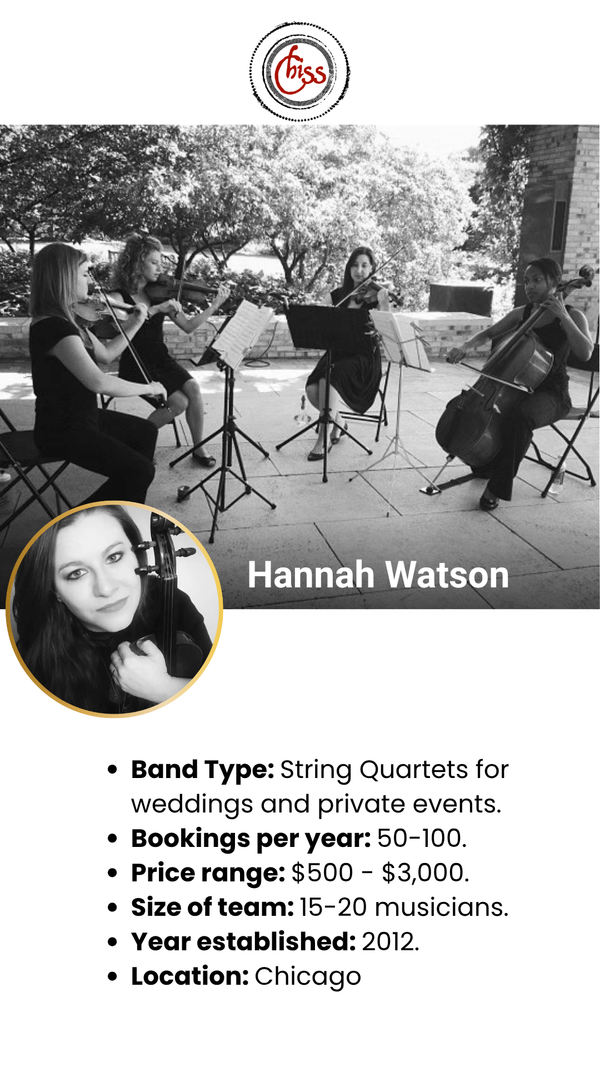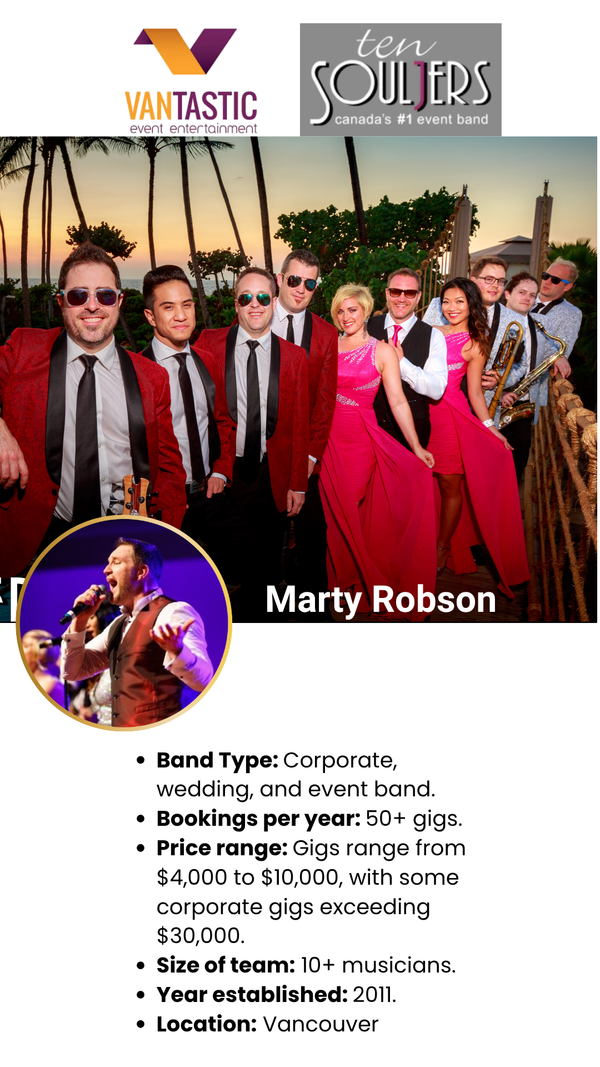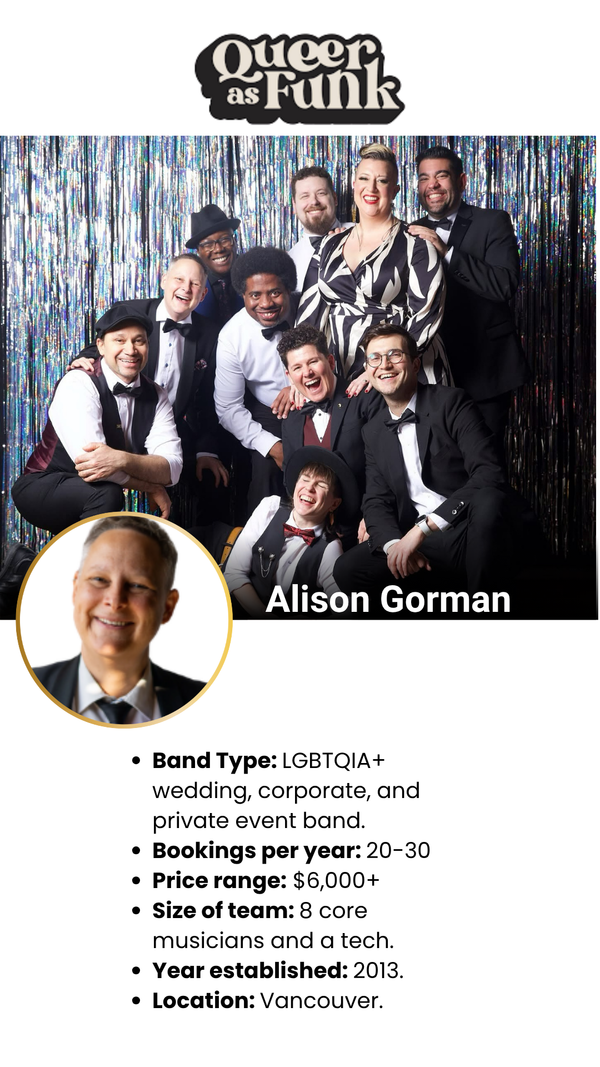How much should your wedding or event band charge for a gig?

Introduction
If you are a general business band (aka: Cover Band, Event Band, Wedding Band, Function Band, Entertainment-for-hire) looking to charge clients for your services, the first question that needs to be answered is "What rate should my band charge?" This is an important question because it's vital to make sure your business is profitable enough to keep going. You don't want to spend hours rehearsing, performing and organizing gigs if you aren't going to get paid for them (or at least make more than what you would have earned doing something else). So let's dive into some common questions about pricing:
How much does it cost to run your general business band?
It’s important to understand that the cost of running a band is not just limited to the price of instruments and equipment. Depending on the size of the venue and the crowd you’re expecting, your costs can vary wildly. In addition to paying all your musicians and crew (which can be quite expensive), you may also need to pay for insurance policies, cover taxes and accounting costs, invest in repairs and maintenance for your vehicle(s), purchase office supplies such as pens or paper clips — even pay for utilities if you have an office space! These additional expenses will increase your total operating budget significantly.
To give you an idea of all the possible band operating costs, here's a sample from our Event Band Rate Calculator above...and if you'd like to use the calculator to figure out your band's best rate, scroll up and try it for yourself.
SAMPLE EVENT BAND GIG EXPENSES AND ASKING PRICE
- Preparation of sheet music for special requests: 3hrs @ $40/hr
- Preparation of set lists: 1hr @ $40/hr
- Booking all the musicians: 2hrs @ $40/hr
- Bookkeeping: 1hr @ $40/hr
- Wardrobe (dry cleaning approx): 9 band members X $20
Total: $700.00
2. Gig Day Expenses
- Musicians (for load-in, soundcheck, performance): 9 band members X $600
- Production (sound, lights, technician) $1,500
Total: $6,900.00
3. Rehearsal Costs (Spread across your 2.66 monthly gigs)
- Time spent organizing a rehearsal: 2hrs @ $40/hr
- Band member fees for 3 hr rehearsal: 9 band members X $150 each
- Cost for rehearsal space: $120 approx for 3 hrs
Total: $0.00
(This is the total cost of all 0 monthly rehearsals divided by the 2.66 monthly gigs you expect to have)
4. Operating Costs Per Month (Spread across your 2.66 monthly gigs)
- Back On Stage app subscription: $23
- Bookkeeping: 2hrs @ $40
- Accounting (income tax, sales tax, reporting): $100
- Marketing: website hosting: $30
- Marketing: email list software: $30
- Marketing: website building and design: $150
- Social media marketing: $150
- Phone line: $30
- Accounting Software: $30
- Customer Relationship Management software: $30
- Dropbox for file sharing: $20
- Business banking account fee: $30
- Insurance: $100
- Wardrobe (purchase of band uniforms, blazers, dresses, ties etc): $200
- Arrangements, charts: 4hrs @ $40
- Audio recordings for promo and new band member training: 4hrs @ $40
- Promo video and video content (film, edit): $400
Total: $647.74
(This is the total cost of all monthly operating costs divided by the 2.66 monthly gigs you expect to have)
5. 10% Profit
- You chose to set aside 10% of each gig's revenue as profit, to be used for business growth and getting through tough times, like pandemics.
Total: $916.42
6. Credit Card Processing Fee (3%)
- One often-overlooked cost of doing business is accepting credit card payments. You should be prepared to pay these merchant fees by building the cost into your pricing. Learn how you can increase your revenue through tipping by accepting credit card payments.
Total: $283.43
SUMMARY
$6,900.00 - Gig Day Expenses
$0.00 - Rehearsal Costs
$647.74 - Operating Costs Per Month
$916.42 - 10% Profit
$283.43 - Credit Card Processing Fee (3%)
$9,447.59 - Your minimum asking price
What type of events are you playing and what exactly is a "gig"?
When you're a general business band, "gigging" means playing music at a wedding, event, birthday party, or the like. Likely, people are there because of the main event, but your band is going to be the highlight for the "party" portion (if you're a dance band) or for simply background entertainment (like during cocktails or dinner).
There are many factors to consider in determining your rate.
Factors such as the type of event, the number of people in attendance, the venue and its location, the duration of the event, time of year and even your experience and reputation can all influence how much you should charge for a gig.
The cost of an event is also an important factor when considering how much to charge for your services. You may not want to take gigs that don’t pay well enough or offer enough exposure for you band’s brand or image.
While there is no set formula for charging per hour with different bands having different rates based on their experience level and popularity it is important that you understand what other bands are charging for similar events so you don't under-price yourself or over-price yourself when approaching potential clients about performing at their event(s).
Do you get paid to rehearse?
The answer is simple: if you are a full-time professional event band, then yes. You should be getting paid to rehearse—and it's an essential part of your gig budget. But even if you're just an amateur group who's learning the ropes, rehearsal time is something that will get eaten up by other obligations. You need to take into account how much it costs your band members or individual musicians to rehearse together (most likely because they're working other jobs on top of playing music) and factor that into any gig rate negotiations as well as your overall strategy when deciding what kind of gigs your band should play.
A general business band needs to sound polished in order to impress potential clients, so rehearsal time is part of the deal when promoting yourself for gigs and looking good at them too!
How much time does it take to set up?
Also, when calculating your band's rate, take into account the time commitment that goes into setting up and doing a proper sound check. For example, for a large corporate event or fancy wedding, you should be set up and checked well before guests arrive. Depending on the size of the band, venue and sound system, setup can take anywhere from 1-5 hours depending on how much equipment needs to be loaded in and wired together (and whether or not there are any additional tasks such as special lighting). This is an important factor because you don't want to have your guests waiting around while you're trying to get everything turned on and ready!
Sound check should also be included in this calculation since it takes between 30 minutes to an hour for this process alone—but if something goes wrong during sound check (like one speaker blows out), then it could take longer than expected too!
How much should you pay your musicians?
How much you should pay your musicians depends on several factors, including the experience and skill level of the musician(s), the type of gig and how much time it takes to rehearse, practice and travel.
To get a sense of what other bands are charging for similar events in your area, refer to this reddit thread. In North America, a standard all-day gig musician rate is $300-$500 per musician (excluding equipment). This would typically include a 1-2 hour load-in and soundcheck, plus a 3-4 hour performance later in the evening. A pretty standard timeline for corporate events and weddings.
What are the business costs associated with running a band?
To keep your business running smoothly, you'll need to consider the following costs:
- Back On Stage app subscription
- Bookkeeping
- Accounting (income tax, sales tax, reporting)
- Marketing: website hosting
- Marketing: email list software
- Marketing: website building and design
- Social media marketing
- Phone line
- Accounting Software
- Customer Relationship Management software
- Dropbox for file sharing
- Business banking account fee
- Insurance
- Wardrobe (purchase of band uniforms, blazers, dresses, ties etc)
- Arrangements, charts
- Audio recordings for promo and new band member training
- Promo video and video content (film, edit)
To help offset some of admin costs, we recommend signing up for an account with Back On Stage band management software. It can help you streamline the back end of your music, , including schedules, setlists, communication, contacts, and more.
How much profit should my band (music business) make?
When you're talking about the "profit margin" of an event band, that refers to the amount of money left over after all expenses have been paid. For example, if your band charges $2500 per gig and has total expenses of $1800, then you'd have a profit margin of $700.
This is important because it'll help you grow your business in good times—and weather the bad ones. It may be tempting to not put aside much profit so that you can pay yourself more money on each gig; however, if this can result you needing to pay for expensive things like insurance deductibles or business costs out of pocket if and when your business cash flow is tight.
Will you be paid a per-gig fee or an hourly rate?
If you have used our Event Band Rate Calculator above, you'll get a quick idea of all the costs associated with running a general business band AND all the costs associated with doing a gig.
In the grand scheme of things, a 2 hour performance versus a 3 hour performance really doesn't make much difference to your business expenses. As such, there shouldn't be much difference in the rate your charge your client for either.
Your band needs to charge on a per-gig basis. It's a business!
As a band, you need to charge on a per-gig basis. You are a business and should be paid for your time and effort. Your band should also pay for expenses associated with gigging, such as transportation and lodging (if it's not within walking distance of your home).
Event bands typically have high overhead costs, so it's important to make enough money from the gigs you play in order to cover those expenses. Otherwise, the band won't be able to continue offering its services at all!
Does being experienced and well known affect your band rate?
Whether you've played hundreds of gigs or this is your first, there's no shame in charging less. You want to make sure that your band is paid a reasonable rate for their services, but it's also important not to price yourself out of the market. If you're still building up your reputation and experience, consider the following factors:
-
What do other bands in your area charge for their services? One way to figure out what bands charge is by going through the secret shop method. Secret shop other bands in your area and see what they're charging for similar types of events (i.e., weddings vs corporate parties).
-
What do you need to pay each member of the band? If one band member decided he wanted a higher salary than his peers because he's been around longer or has more experience, would that be fair? Should everyone earn the same amount? This can be a tricky discussion if personal feelings get involved!
Conclusion
The most important thing is to be fair to yourself and your band. You have to remember that a general business band is a business (duh!) and the point of a business is to make money (otherwise it would just be a hobby!). So you should always focus on charging enough to cover all the costs associated with running an event band.
At the same time, remember that you're providing entertainment for people who may not be used to paying for such things on their own dime—or at least not regularly! So don't forget about them when setting prices; make sure they can afford what they're paying for by keeping your costs down as much as possible while still making it worth everyone's while.






